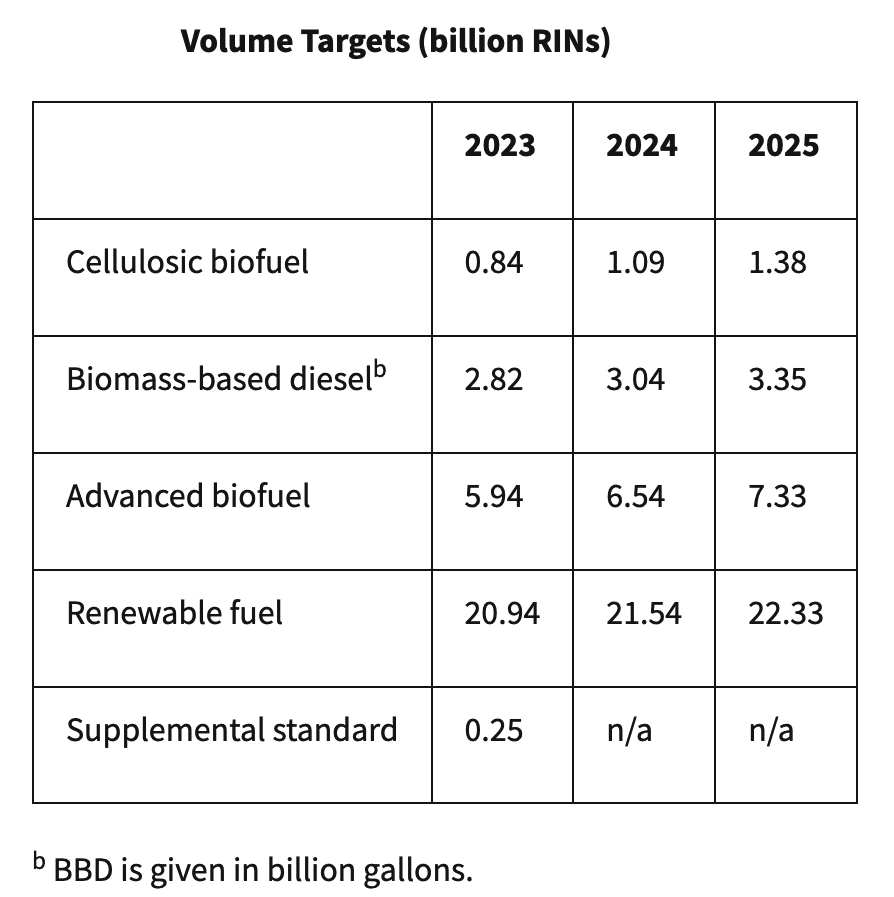U.S. EPA Finalizes Biofuel Mandates for 2023-2025

The U.S. Environmental Protection Agency on June 21 issued a final rule establishing the volume requirements and percentage standards for cellulosic biofuel, biomass-based diesel, advanced biofuel, and total renewable fuel for 2023-2025 under the Renewable Fuel Standard, or RFS, program. The final rule establishes renewable fuel blending volumes of 20.94, 21.54, and 22.33 billion gallons for 2023, 2024, and 2025, respectively. The agency also set a supplemental volume requirement of 250 million gallons of renewable fuel for 2023 in response to the D.C. Circuit Court of Appeals’ remand of the 2016 annual rule. The supplemental standard follows the implementation of a 250-million-gallon supplement for 2022 in a previous action.
The final rule, called “set rule,” marks a new phase for the program as it occurs after period for which the Clean Air Act details specific volume targets. The 2007 Energy Independence and Security Act does not specify statutory volumes after 2022, and EPA established biofuel volume targets in the final rule under the “set” authority provided by the Clean Air Act. The final rule is expected to result in reducing dependence on foreign oil sources by about 130,000 to 140,000 barrels of oil per day over 2023–2025. EPA projects energy security benefits of $173 million to $192 million per year over the timeframe of the rule.
Last December, EPA proposed blending volumes of 20.82, 21.87, and 22.68 billion gallons for 2023, 2024, and 2025, respectively. EPA’s final rule sets conventional renewable fuel requirements of 15 billion gallons for 2024 and 2025, down from the proposed volumes of 15.25 billion for both years. The Renewable Fuels Association called the reductions “inexplicable and unwarranted,” noting that by flatlining conventional renewable fuels, the rule misses a valuable opportunity to accelerate the transition to low- and zero-carbon fuels. The National Corn Growers Association said that “a multi-year RFS volume rule offers stability and certainty for renewable fuels,” however, “the final rule falls short of the emission reductions and cost-saving benefits the higher proposed ethanol volumes would have provided.”
The RFS program is a key federal policy that supports the development, production, and use of low-carbon, domestically produced renewable fuels that play an important role in reducing greenhouse gas emissions in the transportation sector. Renewable fuels can be categorized as conventional fuels (starch feedstocks) and advanced biofuels (cellulosic & biomass-based fuels).
EPA said that it will evaluate feedback received on proposed regulations governing the generation of Renewable Identification Numbers, or RINs, for electricity made from renewable biomass that is used for transportation fuel namely, eRINs. RINs are credits used for compliance with the RFS program. The agency will explore potential paths forward for the eRIN program, while reviewing comments and seeking additional input from stakeholders to inform the next steps.
EnerKnol Pulses like this one are powered by the EnerKnol Platform—the first comprehensive database for real-time energy policy tracking. Sign up for a free trial below for access to key regulatory data and deep industry insights across the energy spectrum.
ACCESS FREE TRIAL